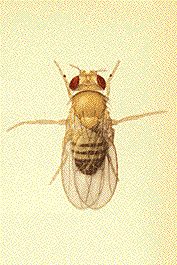The units of selection - Does a gene ever benefit at the expense of an allele?

The DNA level
With normal Mendelian segregation at a genetic locus, on average half of an organism's offspring inherit one of the alleles and the other half the other allele. Mendelian segregation is so to speak 'fair' in its treatment of genes: genes emerge from Mendelian segregation in the same proportions as they went in.
However, there are some curious cases in which Mendel's laws are broken: instead of being inherited by 50% of a heterozygote's offspring, some alleles are consistently over-represented. The segregation distorter gene of Drosophila melanogaster (pictured opposite) is an example. (The phenomenon in general is also called meiotic drive.)
| Next |



